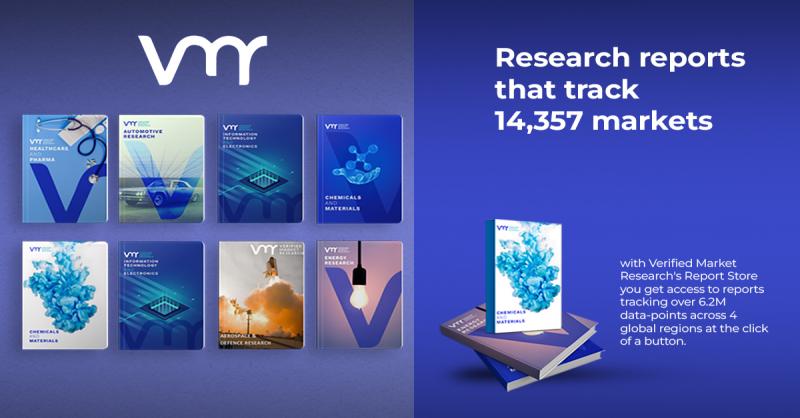Month: November 2024

MMS • RSS
Posted on mongodb google news. Visit mongodb google news
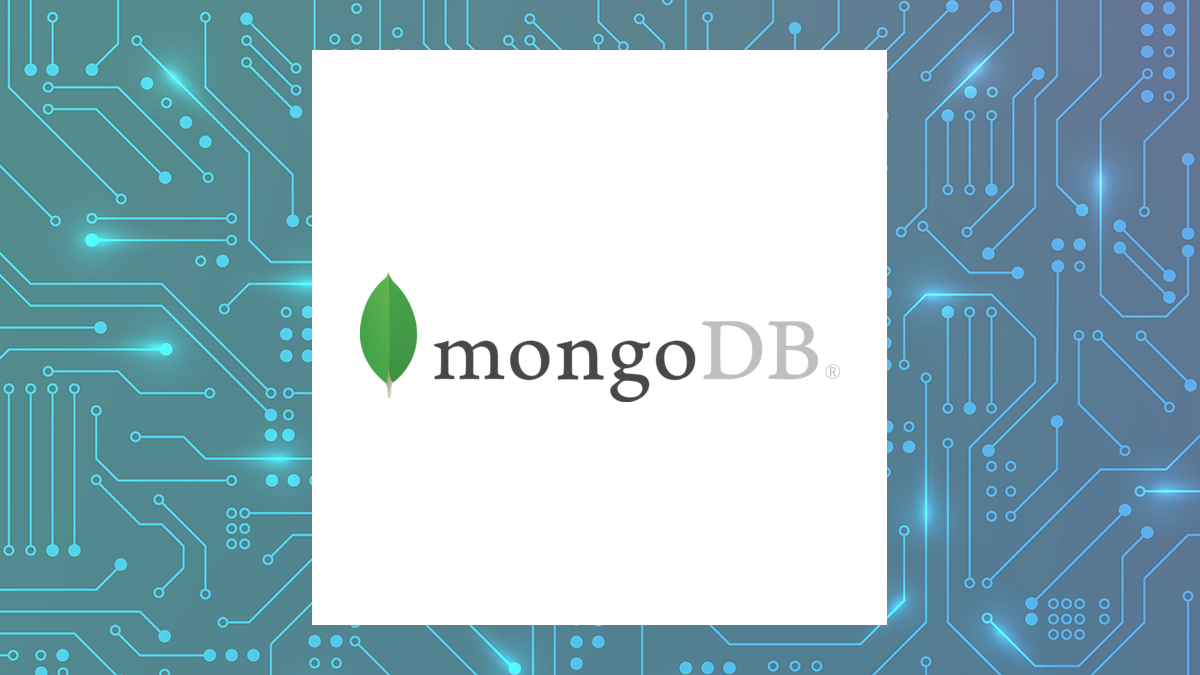 Janney Montgomery Scott LLC purchased a new stake in MongoDB, Inc. (NASDAQ:MDB – Free Report) during the 3rd quarter, according to its most recent disclosure with the Securities and Exchange Commission (SEC). The institutional investor purchased 3,183 shares of the company’s stock, valued at approximately $861,000.
Janney Montgomery Scott LLC purchased a new stake in MongoDB, Inc. (NASDAQ:MDB – Free Report) during the 3rd quarter, according to its most recent disclosure with the Securities and Exchange Commission (SEC). The institutional investor purchased 3,183 shares of the company’s stock, valued at approximately $861,000.
Other hedge funds have also bought and sold shares of the company. Vanguard Group Inc. raised its holdings in shares of MongoDB by 1.0% during the first quarter. Vanguard Group Inc. now owns 6,910,761 shares of the company’s stock valued at $2,478,475,000 after acquiring an additional 68,348 shares during the last quarter. Swedbank AB grew its holdings in shares of MongoDB by 156.3% during the 2nd quarter. Swedbank AB now owns 656,993 shares of the company’s stock worth $164,222,000 after purchasing an additional 400,705 shares during the period. Champlain Investment Partners LLC increased its position in shares of MongoDB by 22.4% during the first quarter. Champlain Investment Partners LLC now owns 550,684 shares of the company’s stock valued at $197,497,000 after acquiring an additional 100,725 shares during the last quarter. Clearbridge Investments LLC lifted its holdings in shares of MongoDB by 109.0% in the 1st quarter. Clearbridge Investments LLC now owns 445,084 shares of the company’s stock worth $159,625,000 after acquiring an additional 232,101 shares during the last quarter. Finally, Thrivent Financial for Lutherans raised its position in MongoDB by 1,098.1% in the second quarter. Thrivent Financial for Lutherans now owns 424,402 shares of the company’s stock valued at $106,084,000 after purchasing an additional 388,979 shares during the period. Hedge funds and other institutional investors own 89.29% of the company’s stock.
Analyst Upgrades and Downgrades
Several analysts have recently issued reports on MDB shares. UBS Group increased their price target on shares of MongoDB from $250.00 to $275.00 and gave the stock a “neutral” rating in a research report on Friday, August 30th. Scotiabank increased their price target on shares of MongoDB from $250.00 to $295.00 and gave the stock a “sector perform” rating in a research note on Friday, August 30th. Stifel Nicolaus increased their price target on MongoDB from $300.00 to $325.00 and gave the stock a “buy” rating in a report on Friday, August 30th. JMP Securities reiterated a “market outperform” rating and issued a $380.00 price objective on shares of MongoDB in a research report on Friday, August 30th. Finally, Truist Financial upped their price objective on MongoDB from $300.00 to $320.00 and gave the company a “buy” rating in a research report on Friday, August 30th. One analyst has rated the stock with a sell rating, five have issued a hold rating, nineteen have given a buy rating and one has given a strong buy rating to the stock. Based on data from MarketBeat, the stock has a consensus rating of “Moderate Buy” and an average target price of $336.54.
Read Our Latest Stock Report on MDB
MongoDB Trading Down 4.1 %
Shares of MongoDB stock opened at $279.77 on Friday. The business has a fifty day simple moving average of $278.10 and a 200-day simple moving average of $274.93. MongoDB, Inc. has a fifty-two week low of $212.74 and a fifty-two week high of $509.62. The firm has a market cap of $20.67 billion, a price-to-earnings ratio of -92.64 and a beta of 1.15. The company has a quick ratio of 5.03, a current ratio of 5.03 and a debt-to-equity ratio of 0.84.
MongoDB (NASDAQ:MDB – Get Free Report) last issued its quarterly earnings results on Thursday, August 29th. The company reported $0.70 earnings per share for the quarter, beating analysts’ consensus estimates of $0.49 by $0.21. The company had revenue of $478.11 million during the quarter, compared to the consensus estimate of $465.03 million. MongoDB had a negative net margin of 12.08% and a negative return on equity of 15.06%. MongoDB’s revenue was up 12.8% on a year-over-year basis. During the same period in the prior year, the company earned ($0.63) EPS. On average, equities analysts forecast that MongoDB, Inc. will post -2.39 EPS for the current fiscal year.
Insider Buying and Selling at MongoDB
In related news, CRO Cedric Pech sold 302 shares of the firm’s stock in a transaction that occurred on Wednesday, October 2nd. The shares were sold at an average price of $256.25, for a total value of $77,387.50. Following the completion of the transaction, the executive now owns 33,440 shares of the company’s stock, valued at approximately $8,569,000. This trade represents a 0.90 % decrease in their position. The transaction was disclosed in a document filed with the SEC, which is accessible through this hyperlink. Also, Director Dwight A. Merriman sold 3,000 shares of MongoDB stock in a transaction that occurred on Monday, November 4th. The stock was sold at an average price of $269.57, for a total transaction of $808,710.00. Following the transaction, the director now owns 1,127,006 shares in the company, valued at approximately $303,807,007.42. The trade was a 0.27 % decrease in their ownership of the stock. The disclosure for this sale can be found here. Over the last 90 days, insiders have sold 24,281 shares of company stock valued at $6,657,121. Corporate insiders own 3.60% of the company’s stock.
MongoDB Profile
MongoDB, Inc, together with its subsidiaries, provides general purpose database platform worldwide. The company provides MongoDB Atlas, a hosted multi-cloud database-as-a-service solution; MongoDB Enterprise Advanced, a commercial database server for enterprise customers to run in the cloud, on-premises, or in a hybrid environment; and Community Server, a free-to-download version of its database, which includes the functionality that developers need to get started with MongoDB.
Read More
Want to see what other hedge funds are holding MDB? Visit HoldingsChannel.com to get the latest 13F filings and insider trades for MongoDB, Inc. (NASDAQ:MDB – Free Report).
Receive News & Ratings for MongoDB Daily – Enter your email address below to receive a concise daily summary of the latest news and analysts’ ratings for MongoDB and related companies with MarketBeat.com’s FREE daily email newsletter.
Article originally posted on mongodb google news. Visit mongodb google news

MMS • Steef-Jan Wiggers
Article originally posted on InfoQ. Visit InfoQ

GitHub has introduced significant updates at GitHub Universe 2024, showcasing a shift towards enhanced developer autonomy and AI-native experiences. The event centered on accessibility, innovation, and multi-model flexibility, offering tools designed to simplify workflows and enable developers of all skill levels to harness the power of artificial intelligence.
The platform’s Copilot now supports multiple AI models, including OpenAI, Anthropic, and Google Gemini, offering developers greater flexibility. Moreover, developers can select an AI model that aligns with their project requirements. The company explains in a press release:
Developers can toggle between models during a conversation with Copilot Chat to choose the right model for the right use case, or continue to let Copilot use its powerful default. With this multi-model approach, GitHub is enabling developers to build with an array of leading models in the workflows they’re accustomed to.
Another update was the launch of GitHub Spark, an AI-driven tool that allows users to create complete applications using natural language prompts. This innovation significantly lowers the barrier to entry for individuals new to coding, with GitHub estimating that Spark has the potential to reach over one billion users worldwide. By translating everyday language into functional code, Spark simplifies app creation, making it accessible to seasoned developers and beginners. On X, Kitze, a Web developer and Educator, tweeted:
GitHub Spark is the future of coding.
Just let the user generate what they want; no one will care about the underlying code.
(except the 4 diehard vim nerds who’ll still yell at a cloud about the good ole days of manual programming)
In addition, GitHub has also integrated enhanced AI functionalities within popular development environments like Visual Studio Code. These updates include more intuitive code suggestions, personalized assistance, and the ability to debug and test applications with minimal manual intervention. Additionally, Copilot Extensions allows developers to customize their AI tools, further streamlining their workflows and improving efficiency across multiple stages of development.
Other updates on the GitHub platform include security as a focal point of the company’s offerings, with the introduction of Copilot Autofix. This feature leverages AI to detect and resolve vulnerabilities in real time, reducing the need for exhaustive manual reviews. By addressing security risks proactively, GitHub reaffirms its commitment to fostering safer development practices and protecting critical projects.
Earlier, in a Reddit thread, a correspondent commented on the Autofix feature:
It feels like AI was just slapped on to this to make it more marketable
I don’t see how AI is more effective at this than static analysis. A tool like Sonar can already do this very effectively, and it does it without needing AI.
Furthermore, over 55,000 developers have used Copilot Workspace to plan, build, test, and run code, resulting in over 10,000 merged pull requests. Based on developer feedback, GitHub has implemented over 100 updates, including a build and repair agent, error correction commands, brainstorming mode, VS Code integrations, iterative feedback, and enhanced AI assistance for improved context and personalization.
Lastly, the company expanded features with GitHub Models in public preview. The company stated that over 70,000 developers have used the interactive model playground to experiment with various AI models, including OpenAI, Meta Llama 3, Microsoft Phi, and Cohere Command R. New capabilities include side-by-side model comparison, support for multi-modal models, and the ability to save and share prompts and parameters, along with new cookbooks and SDK support in GitHub Codespaces.

MMS • RSS
Posted on mongodb google news. Visit mongodb google news
Janney Montgomery Scott LLC purchased a new position in shares of MongoDB, Inc. (NASDAQ:MDB – Free Report) during the third quarter, according to the company in its most recent Form 13F filing with the Securities and Exchange Commission (SEC). The institutional investor purchased 3,183 shares of the company’s stock, valued at approximately $861,000.
A number of other large investors have also added to or reduced their stakes in MDB. Vanguard Group Inc. lifted its stake in shares of MongoDB by 1.0% in the 1st quarter. Vanguard Group Inc. now owns 6,910,761 shares of the company’s stock valued at $2,478,475,000 after acquiring an additional 68,348 shares during the last quarter. Swedbank AB boosted its stake in shares of MongoDB by 156.3% in the 2nd quarter. Swedbank AB now owns 656,993 shares of the company’s stock worth $164,222,000 after buying an additional 400,705 shares during the last quarter. Champlain Investment Partners LLC lifted its stake in MongoDB by 22.4% in the first quarter. Champlain Investment Partners LLC now owns 550,684 shares of the company’s stock valued at $197,497,000 after purchasing an additional 100,725 shares during the last quarter. Clearbridge Investments LLC lifted its stake in MongoDB by 109.0% in the first quarter. Clearbridge Investments LLC now owns 445,084 shares of the company’s stock valued at $159,625,000 after purchasing an additional 232,101 shares during the last quarter. Finally, Thrivent Financial for Lutherans lifted its stake in MongoDB by 1,098.1% in the second quarter. Thrivent Financial for Lutherans now owns 424,402 shares of the company’s stock valued at $106,084,000 after purchasing an additional 388,979 shares during the last quarter. Institutional investors and hedge funds own 89.29% of the company’s stock.
Analyst Ratings Changes
Several equities research analysts have issued reports on MDB shares. Needham & Company LLC increased their target price on MongoDB from $290.00 to $335.00 and gave the stock a “buy” rating in a research report on Friday, August 30th. Wells Fargo & Company increased their target price on MongoDB from $300.00 to $350.00 and gave the company an “overweight” rating in a research note on Friday, August 30th. Morgan Stanley raised their price objective on MongoDB from $320.00 to $340.00 and gave the company an “overweight” rating in a research note on Friday, August 30th. Stifel Nicolaus raised their price objective on MongoDB from $300.00 to $325.00 and gave the company a “buy” rating in a research note on Friday, August 30th. Finally, Bank of America increased their target price on shares of MongoDB from $300.00 to $350.00 and gave the stock a “buy” rating in a report on Friday, August 30th. One analyst has rated the stock with a sell rating, five have assigned a hold rating, nineteen have assigned a buy rating and one has given a strong buy rating to the stock. According to MarketBeat, the stock has an average rating of “Moderate Buy” and an average target price of $336.54.
View Our Latest Analysis on MongoDB
Insiders Place Their Bets
In other news, CFO Michael Lawrence Gordon sold 5,000 shares of MongoDB stock in a transaction on Monday, October 14th. The shares were sold at an average price of $290.31, for a total transaction of $1,451,550.00. Following the transaction, the chief financial officer now owns 80,307 shares in the company, valued at $23,313,925.17. This trade represents a 5.86 % decrease in their position. The sale was disclosed in a legal filing with the SEC, which is available through this hyperlink. Also, Director Dwight A. Merriman sold 3,000 shares of MongoDB stock in a transaction on Monday, November 4th. The stock was sold at an average price of $269.57, for a total transaction of $808,710.00. Following the transaction, the director now owns 1,127,006 shares in the company, valued at $303,807,007.42. This represents a 0.27 % decrease in their position. The disclosure for this sale can be found here. In the last quarter, insiders sold 24,281 shares of company stock valued at $6,657,121. Company insiders own 3.60% of the company’s stock.
MongoDB Trading Down 4.1 %
NASDAQ:MDB opened at $279.77 on Friday. The company has a current ratio of 5.03, a quick ratio of 5.03 and a debt-to-equity ratio of 0.84. MongoDB, Inc. has a 12 month low of $212.74 and a 12 month high of $509.62. The company has a market cap of $20.67 billion, a PE ratio of -92.64 and a beta of 1.15. The company has a 50 day simple moving average of $278.10 and a two-hundred day simple moving average of $274.30.
MongoDB (NASDAQ:MDB – Get Free Report) last posted its earnings results on Thursday, August 29th. The company reported $0.70 EPS for the quarter, topping analysts’ consensus estimates of $0.49 by $0.21. MongoDB had a negative net margin of 12.08% and a negative return on equity of 15.06%. The business had revenue of $478.11 million during the quarter, compared to the consensus estimate of $465.03 million. During the same quarter in the previous year, the firm posted ($0.63) EPS. The firm’s revenue was up 12.8% on a year-over-year basis. Research analysts forecast that MongoDB, Inc. will post -2.39 earnings per share for the current year.
About MongoDB
MongoDB, Inc, together with its subsidiaries, provides general purpose database platform worldwide. The company provides MongoDB Atlas, a hosted multi-cloud database-as-a-service solution; MongoDB Enterprise Advanced, a commercial database server for enterprise customers to run in the cloud, on-premises, or in a hybrid environment; and Community Server, a free-to-download version of its database, which includes the functionality that developers need to get started with MongoDB.
Further Reading
Before you consider MongoDB, you’ll want to hear this.
MarketBeat keeps track of Wall Street’s top-rated and best performing research analysts and the stocks they recommend to their clients on a daily basis. MarketBeat has identified the five stocks that top analysts are quietly whispering to their clients to buy now before the broader market catches on… and MongoDB wasn’t on the list.
While MongoDB currently has a “Moderate Buy” rating among analysts, top-rated analysts believe these five stocks are better buys.

MarketBeat has just released its list of 20 stocks that Wall Street analysts hate. These companies may appear to have good fundamentals, but top analysts smell something seriously rotten. Are any of these companies lurking around your portfolio? Find out by clicking the link below.
Article originally posted on mongodb google news. Visit mongodb google news

MMS • RSS
Posted on mongodb google news. Visit mongodb google news
MongoDB Inc (MDB, Financial) Chief Revenue Officer Cedric Pech sold 965 shares of the company on November 13, 2024, according to a recent SEC Filing. Following this transaction, the insider now owns 31,482 shares of MongoDB Inc.
MongoDB Inc is a general-purpose database platform that enables developers to build applications. The company’s technology, known as MongoDB, allows developers to work with both structured and unstructured data, including JSON-like documents. This flexibility makes it particularly useful for applications that require a scalable, agile, and performance-oriented database solution.
Over the past year, Cedric Pech has sold a total of 16,640 shares and has not purchased any shares. This recent transaction is part of a broader trend seen within the company, where there have been 58 insider sells and no insider buys over the past year.
Shares of MongoDB Inc were trading at $300 on the day of the transaction, giving the company a market cap of approximately $20.67 billion. The stock is currently considered significantly undervalued with a price-to-GF Value ratio of 0.66, based on a GF Value of $456.20.
The GF Value is a proprietary measure used to determine the fair value of a stock, taking into account historical trading multiples, an adjustment factor based on the company’s past performance, and expected future business outcomes.
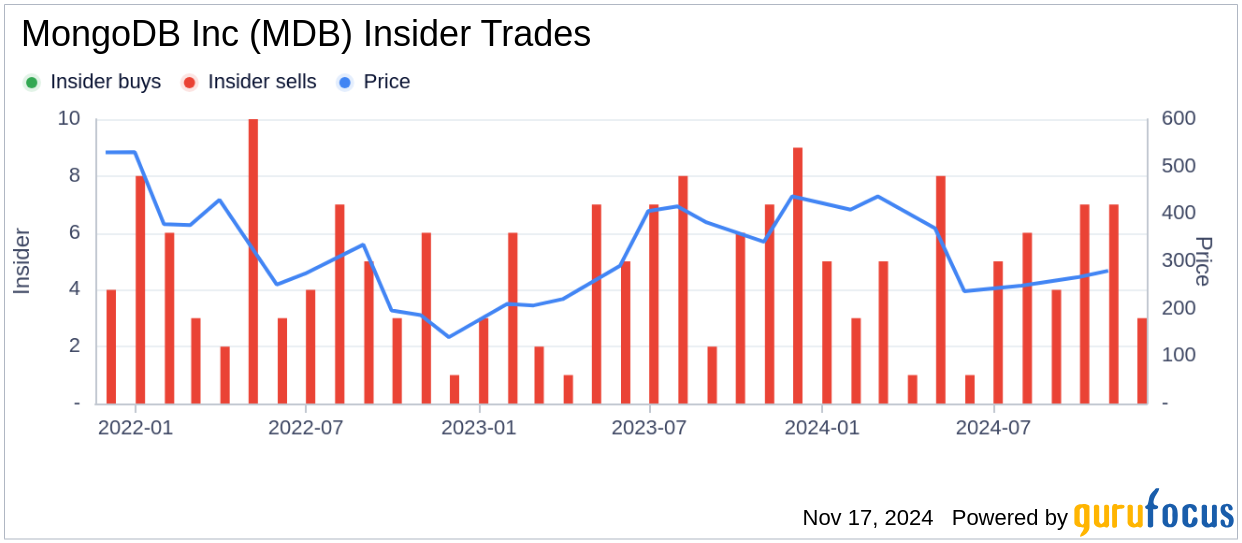
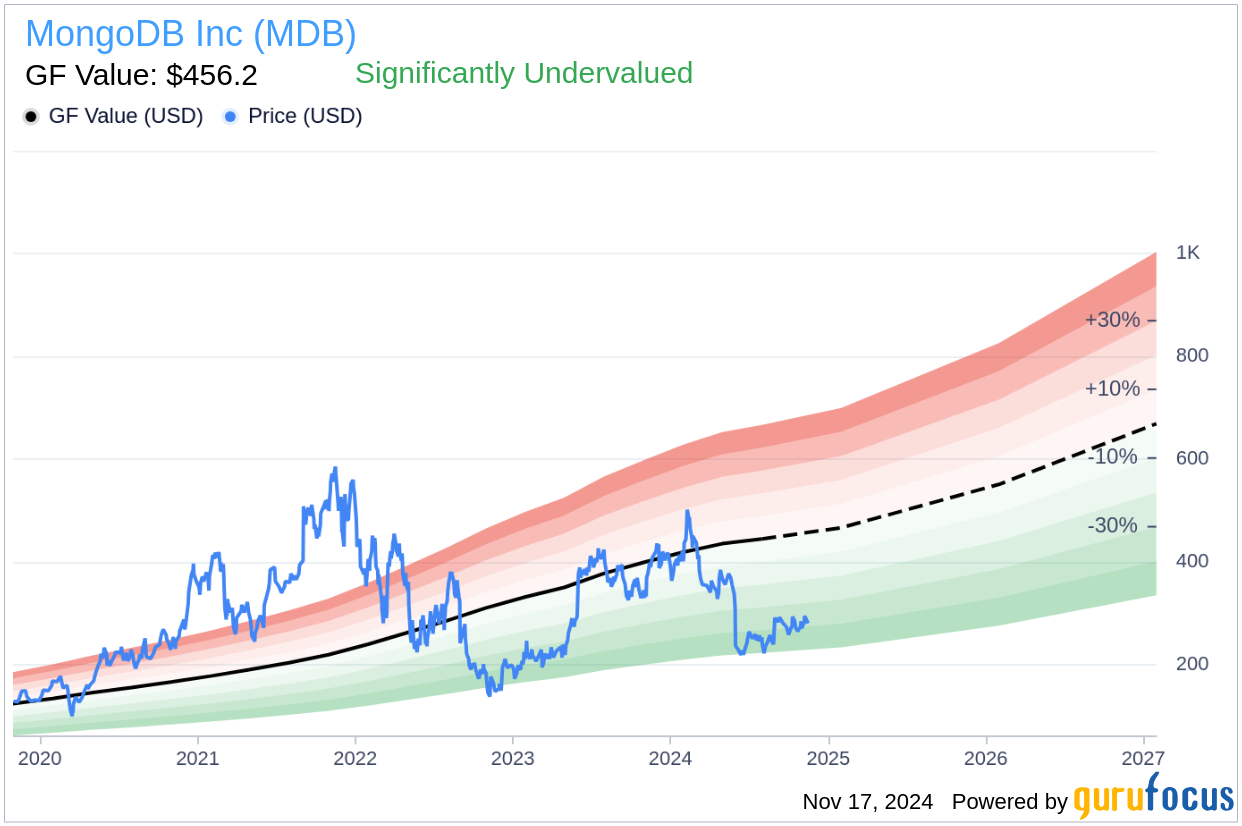
This insider sale comes at a time when MongoDB Inc’s stock is deemed significantly undervalued according to the GF Value, suggesting a potential discrepancy between the insider’s actions and the estimated intrinsic value of the stock.
This article, generated by GuruFocus, is designed to provide general insights and is not tailored financial advice. Our commentary is rooted in historical data and analyst projections, utilizing an impartial methodology, and is not intended to serve as specific investment guidance. It does not formulate a recommendation to purchase or divest any stock and does not consider individual investment objectives or financial circumstances. Our objective is to deliver long-term, fundamental data-driven analysis. Be aware that our analysis might not incorporate the most recent, price-sensitive company announcements or qualitative information. GuruFocus holds no position in the stocks mentioned herein.
Article originally posted on mongodb google news. Visit mongodb google news

MMS • RSS
Posted on mongodb google news. Visit mongodb google news
Overview of the Recent Transaction
On November 15, 2024, Prudential Financial Inc made a significant addition to its investment portfolio by acquiring 3,180,953 shares of MongoDB Inc (MDB, Financial) at a price of $291.59 per share. This transaction not only reflects a substantial investment in the tech sector but also marks a notable expansion of Prudential’s holdings in MongoDB, bringing the total shares owned to 3,183,210. This move has a calculated impact of 1.29% on the firm’s portfolio, indicating a strategic positioning by Prudential in the technology landscape.
Prudential Financial Inc: A Firm’s Profile
Prudential Financial Inc, headquartered at 751 Broad Street, Newark, NJ, operates as a diversified financial services firm. With a robust portfolio of over 2,706 stocks, Prudential is known for its strategic investments across various sectors, with a significant emphasis on technology and financial services. The firm’s top holdings include major entities such as iShares Core S&P 500 ETF (IVV, Financial), Apple Inc (AAPL, Financial), and Microsoft Corp (MSFT, Financial), showcasing its inclination towards high-performing tech giants.
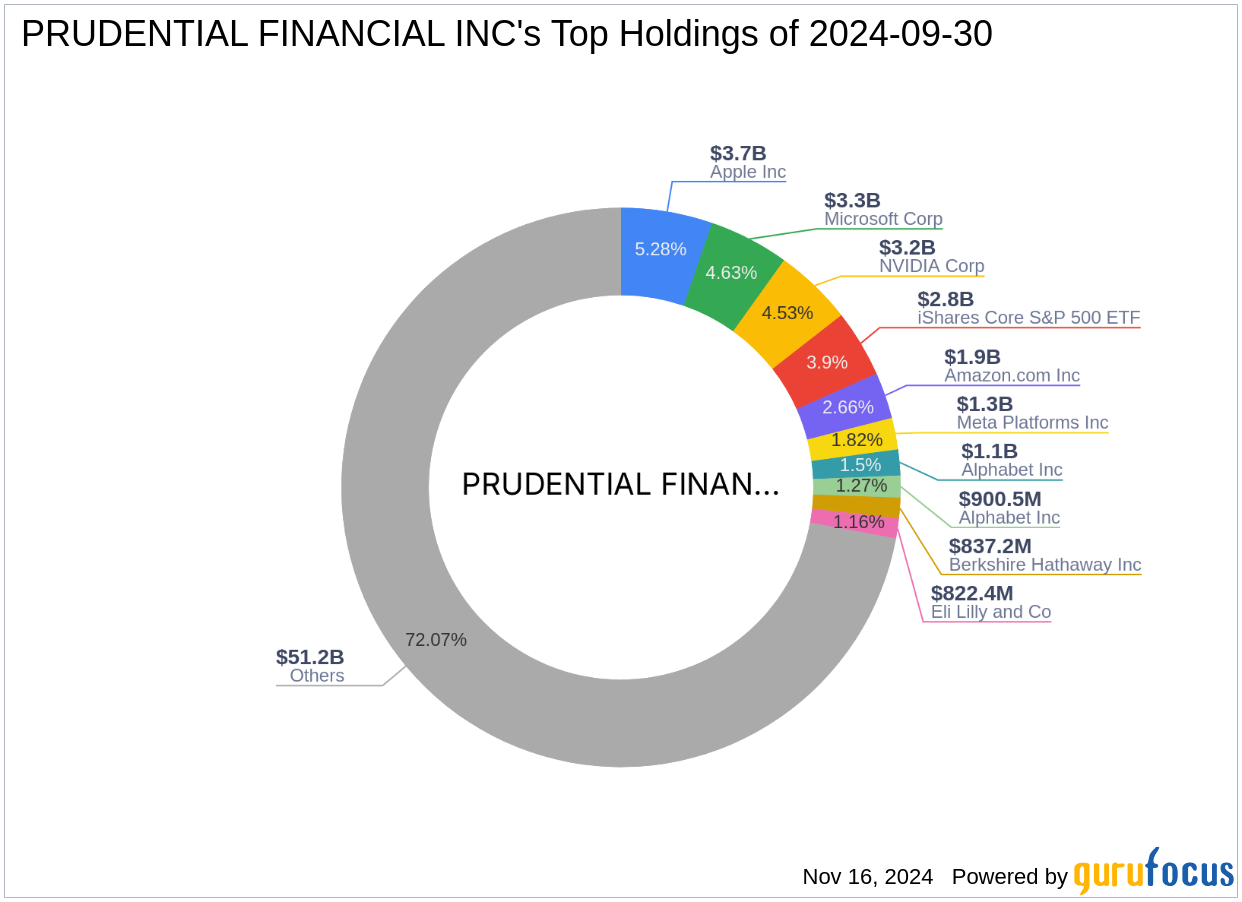
Introduction to MongoDB Inc
Founded in 2007, MongoDB Inc has emerged as a leader in the software industry, specializing in a document-oriented database platform. It serves approximately 33,000 paying customers and boasts over 1.5 million free users. MongoDB’s business model revolves around licensing and subscription services, catering to a diverse range of programming languages and deployment needs. The company’s primary revenue streams include MongoDB Atlas-related services, other subscriptions, and professional services.
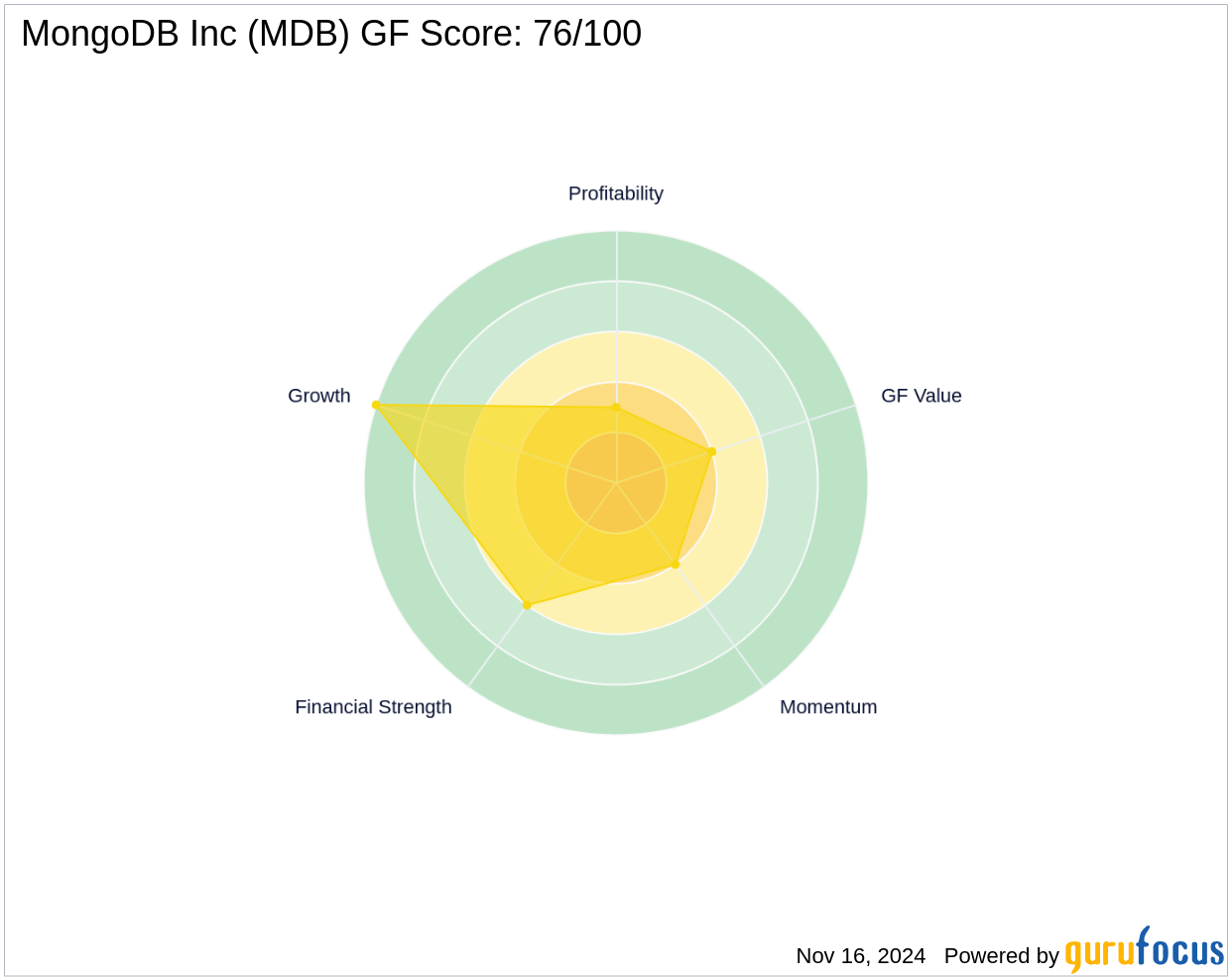
Financial and Market Analysis of MongoDB Inc
MongoDB Inc is currently valued at a market capitalization of $20.67 billion, with a recent stock price of $279.77, reflecting a 4.05% decrease since the transaction date. Despite this dip, MongoDB remains significantly undervalued according to GF Value, with a current intrinsic value of $456.20. The company’s financial health shows mixed signals; it boasts a strong Growth Rank of 10/10 but struggles with profitability, holding a Profitability Rank of 3/10.
Impact of the Trade on Prudential Financial Inc’s Portfolio
The acquisition of MongoDB shares significantly enhances Prudential’s exposure to the technology sector, aligning with its strategy to invest in high-growth potential areas. This new position in MongoDB now represents 1.29% of Prudential’s total portfolio, underscoring the strategic importance of this investment amidst their top holdings in the tech-dominated landscape.
Broader Market Context and Investor Interest
MongoDB has also attracted attention from other notable investors like Ron Baron (Trades, Portfolio) and Joel Greenblatt (Trades, Portfolio), indicating a broader market interest in its business model and growth potential. Within the context of current market trends, MongoDB’s innovative solutions in database management continue to draw significant investor interest, despite recent market volatilities.
Conclusion
Prudential Financial Inc’s recent acquisition of MongoDB shares is a strategic move that aligns with its investment philosophy and commitment to technology and innovation. This transaction not only diversifies Prudential’s portfolio but also positions the firm to capitalize on the growth trajectory of MongoDB Inc. As the market continues to evolve, this investment may play a pivotal role in shaping Prudential’s financial landscape.
This article, generated by GuruFocus, is designed to provide general insights and is not tailored financial advice. Our commentary is rooted in historical data and analyst projections, utilizing an impartial methodology, and is not intended to serve as specific investment guidance. It does not formulate a recommendation to purchase or divest any stock and does not consider individual investment objectives or financial circumstances. Our objective is to deliver long-term, fundamental data-driven analysis. Be aware that our analysis might not incorporate the most recent, price-sensitive company announcements or qualitative information. GuruFocus holds no position in the stocks mentioned herein.
Article originally posted on mongodb google news. Visit mongodb google news

MMS • Steef-Jan Wiggers
Article originally posted on InfoQ. Visit InfoQ
Microsoft recently launched a public preview of native vector support for the Azure SQL Database. With this update, the database can now store and process vector embeddings directly within it.
Earlier, the support native vector support for the Azure SQL Database was in early adopter preview as the company sees the integration of vector search within RDBMS as a means for customers to perform vector similarity searches alongside traditional SQL queries, enhancing data analysis and decision-making.
Vector embeddings, representing complex data types such as text, images, and audio, are essential for modern AI applications. By adding native support, Azure SQL Database removes the need for separate vector databases, simplifying the development process for data teams and providing a unified data management solution.
The introduction of a new data type, VECTOR, allows databases to store, search, and analyze vector data in a structured format. This addition is further complemented by the VECTOR_DISTANCE function, which computes the similarity between vectors—a fundamental operation in AI tasks like semantic search, which ranks results based on meaning rather than just keywords. This function enables efficient handling of vector similarity, allowing applications to deliver more relevant and contextually aware responses.
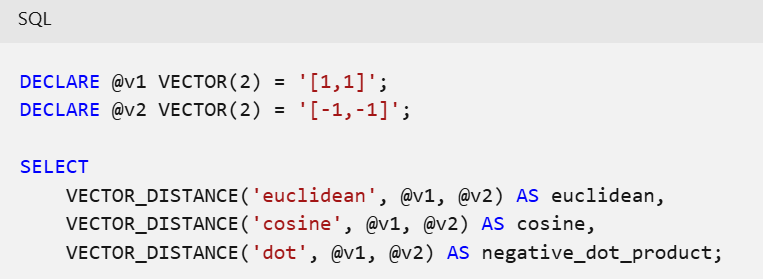
(Source: Azure SQL Devs’ Corner blog post)
Native vector support offers significant performance benefits over external vector databases by eliminating the need for data movement between platforms. This reduces latency in operations and minimizes the complexities associated with managing and integrating multiple databases. Since vector data is natively managed within Azure SQL Database, developers can leverage existing SQL expertise to handle complex AI tasks without mastering new, specialized systems.
Including vector support directly within Azure SQL Database enables numerous industry applications. For instance, e-commerce companies can create recommendation engines that suggest products based on customer preferences, leveraging vector similarity for product matching. Similarly, healthcare providers can deploy advanced diagnostic tools that analyze patient records and medical data to identify patterns indicative of specific health conditions, using vector embeddings to improve prediction accuracy.
In a Medium blog post, Juan C Olamendy, an AI-preneur writes:
In the realm of recommendation systems, vector databases play a pivotal role in efficiently storing and retrieving high-dimensional vectors.
He mentions Vector databases like Pinecone, Milvus, Qdrant, and Weaviate while discussing VectorDB and RecSys in depth.
Another anticipated use is in real-time semantic search. By processing natural language embeddings, businesses can develop search systems that understand the context of queries, improving the user experience by delivering more meaningful results. This functionality is especially relevant to industries such as media, where semantic search can enhance content discovery and engagement.
Lastly, Microsoft has facilitated seamless integration with popular AI frameworks, including LangChain and Semantic Kernel. These integrations allow developers to extend vector processing capabilities within Azure SQL Database to their existing AI workflows, making adopting this technology more straightforward and accessible. Furthermore, a repo is available containing samples that are meant to help use the new Native Vector Support in the Azure SQL DB feature.

MMS • Renato Losio
Article originally posted on InfoQ. Visit InfoQ

AWS recently announced that Amazon Q Developer now supports inline chat, enabling developers to discuss and resolve code issues within the editor. Combining the benefits of in-IDE chat with the ability to directly update codes, this feature is powered by Claude 3.5 and available in Visual Studio Code and JetBrains IDEs.
Previously known as Amazon CodeWhisperer and generally available since May, Q Developer is Amazon’s response to Microsoft’s GitHub Copilot – an AI coding assistant designed to help developers focus more on coding and less on maintenance tasks. With the new inline chat feature, developers can select sections of code for assistance and initiate a chat within Visual Studio Code or JetBrains IDEs, requesting actions like “Optimize this code,” “Add comments,” or “Write tests.” Introducing the new feature and discussing its applications, Jose Yapur, senior developer advocate at AWS, writes:
Inline chat allows me to provide additional context, such as a description of the bug I’m trying to fix, directly in the code editor. The AI-generated response is then seamlessly merged into my existing code, rather than requiring me to copy and paste from a separate chat window. (…) This new capability is ideal for editing an existing file to fix issues, optimize code, refactor code, add comments.
Powered by Anthropic’s Claude 3.5 Sonnet and designed for code refactoring, debugging, and documentation creation, the inline chat functionality is a new addition to Amazon Q, though not unique within the AI coding assistant space. Comparing it to existing tools like Cursor, a fork of VS Code, Luc van Donkersgoed, principal engineer at PostNL, writes:
Amazon Q looked at Cursor AI and thought… We can do that! And honestly, I’m happy for it. Cursor has great UX, everybody should look at what they can steal.. err.. learn from them.
The new inline chat feature allows developers to update code directly within the editor, providing a diff of the code to be added or removed. While similar AI capabilities were previously available in an external chat panel, developers had to manually copy responses, merge changes, or create new methods, which still required cleaning up old code. Yapur adds:
Whether it’s generating new features, refactoring existing code, or adding comprehensive documentation, inline chat streamlines the workflow, eliminating the need to switch between separate chat and editor windows.
According to SWE-bench, Claude 3.5 Sonnet currently ranks as the top model for coding assistants, outperforming OpenAI’s o1 models. While developer feedback has been mixed over the past few months, Denis Fedotenko, senior engineering director at BlackBerry, comments:
My experience so far has been very encouraging. I have tried Amazon Q with Linux kernel C code and questions (a bit of hallucination there) and with C# – very solid. All within VSCode.
The new feature is included in Q Developer’s Free tier, with a capped number of requests per month, and is available in all regions where Q Developer is currently supported. The Pro tier is priced at 19 USD per user per month.

MMS • RSS
Posted on mongodb google news. Visit mongodb google news
𝐔𝐒𝐀, 𝐍𝐞𝐰 𝐉𝐞𝐫𝐬𝐞𝐲: According to Verified Market Research analysis, the global Nosql Database Market size is reached a valuation of USD 6.47 Billion in 2023, with projections to achieve USD 44.66 Billion by 2031, demonstrating a 𝐂𝐀𝐆𝐑 30.14% 𝐟𝐫𝐨𝐦 𝟐𝟎𝟐𝟒 𝐭𝐨 𝟐𝟎𝟑𝟏.
What is the current outlook for the NoSQL database market?
The NoSQL database market is experiencing significant growth, driven by increasing data volume, the rise of cloud computing, and the need for scalable, flexible data storage solutions. Market reports indicate that the NoSQL database market size was valued at around $14.3 billion in 2022 and is expected to grow at a compound annual growth rate (CAGR) of over 23% from 2023 to 2030. This growth is attributed to industries such as e-commerce, telecommunications, and financial services adopting NoSQL databases for their ability to handle unstructured or semi-structured data efficiently. Additionally, cloud-based NoSQL solutions have gained popularity due to their cost-effectiveness and ease of deployment. The shift toward real-time data processing and analytics, along with the increasing use of IoT devices, further fuels the demand for NoSQL databases, particularly document-based and key-value stores like MongoDB, Couchbase, and Redis.
https://www.verifiedmarketresearch.com/download-sample/?rid=129411&utm_source=OpenPR&utm_medium=386
What are the key drivers and challenges in the NoSQL database market?
Key drivers of the NoSQL market include the growing need for faster data processing, support for large-scale applications, and the growing trend of microservices architecture. Organizations are moving away from traditional relational databases due to limitations in handling high-volume, unstructured data, which NoSQL databases are optimized to process. The expansion of IoT and the integration of AI and machine learning also rely on NoSQL technologies for real-time data analysis. However, challenges persist, such as data consistency and the lack of universal standards in NoSQL databases, which can make implementation complex. Additionally, while NoSQL databases excel at horizontal scaling, integrating them with legacy systems or relational databases can present technical and logistical hurdles, particularly for large enterprises that have substantial investments in RDBMS systems.
What are the investment opportunities in the NoSQL database market?
Investors can look to capitalize on the rapidly expanding NoSQL market by targeting key players such as MongoDB, Couchbase, and Redis Labs, which are well-positioned due to their innovative product offerings and large customer bases. Additionally, opportunities exist in the burgeoning cloud-based NoSQL services market, where companies like Amazon (DynamoDB), Google (Firestore), and Microsoft (Cosmos DB) offer scalable NoSQL solutions as part of their cloud portfolios. As digital transformation accelerates, businesses seeking to modernize their data management systems will increasingly adopt NoSQL platforms, making this a high-growth investment sector. Venture capital is also likely to target emerging startups providing specialized NoSQL solutions, particularly those offering machine learning, analytics, or blockchain-related capabilities, as these trends align with broader technological advancements in the market.
𝐌𝐚𝐣𝐨𝐫 𝐜𝐨𝐦𝐩𝐚𝐧𝐢𝐞𝐬
Objectivity Inc, Neo Technology Inc, MongoDB Inc, MarkLogic Corporation, Google LLC, Couchbase Inc, Microsoft Corporation, DataStax Inc, Amazon Web Services Inc & Aerospike Inc.
𝐓𝐫𝐞𝐧𝐝𝐬
𝐆𝐥𝐨𝐛𝐚𝐥 𝐌𝐚𝐫𝐤𝐞𝐭 𝐄𝐱𝐩𝐚𝐧𝐬𝐢𝐨𝐧: As markets continue to globalize, numerous enterprises in the Nosql Database sector are actively exploring opportunities in emerging markets. Leveraging their expertise and resources, these companies are strategically expanding their footprint and reaching out to new customer segments, thereby capitalizing on evolving market dynamics.
𝐒𝐮𝐬𝐭𝐚𝐢𝐧𝐚𝐛𝐥𝐞 𝐏𝐫𝐚𝐜𝐭𝐢𝐜𝐞𝐬: There’s a noticeable surge in prioritizing sustainability within the market, spurred by both consumer preferences and regulatory mandates. This shift is manifesting in heightened adoption of eco-friendly materials, implementation of energy-efficient processes, and proactive initiatives aimed at waste reduction.
𝐃𝐢𝐠𝐢𝐭𝐚𝐥 𝐓𝐫𝐚𝐧𝐬𝐟𝐨𝐫𝐦𝐚𝐭𝐢𝐨𝐧: The Nosql Database market is swiftly embracing digital transformation, incorporating cutting-edge technologies like AI, IoT, and blockchain. This transition is significantly enhancing operational efficiency, fostering product innovation, and elevating customer experiences through personalization.
𝐇𝐞𝐚𝐥𝐭𝐡 𝐚𝐧𝐝 𝐖𝐞𝐥𝐥𝐧𝐞𝐬𝐬: Consumers are placing a growing emphasis on health and wellness, catalyzing the introduction of functional and nutritious products in the Nosql Database market. Additionally, there’s a notable trend towards integrating health-focused attributes into existing offerings to meet evolving consumer expectations.
𝐊𝐞𝐲 𝐒𝐞𝐠𝐦𝐞𝐧𝐭𝐬 𝐀𝐫𝐞 𝐂𝐨𝐯𝐞𝐫𝐞𝐝 𝐢𝐧 𝐑𝐞𝐩𝐨𝐫𝐭
NoSQL Database Market, By Type
• Graph Database
• Column Based Store
• Document Database
• Key-Value Store
NoSQL Database Market, By Application
• Web Apps
• Data Analytics
• Mobile Apps
• Metadata Store
• Cache Memory
• Others
NoSQL Database Market, By Industry Vertical
• Retail
• Gaming
• IT
• Others
𝐆𝐞𝐭 𝐚 𝐃𝐢𝐬𝐜𝐨𝐮𝐧𝐭 𝐎𝐧 𝐓𝐡𝐞 𝐏𝐮𝐫𝐜𝐡𝐚𝐬𝐞 𝐎𝐟 𝐓𝐡𝐢𝐬 𝐑𝐞𝐩𝐨𝐫𝐭 @ https://www.verifiedmarketresearch.com/ask-for-discount?rid=129411&utm_source=OpenPR&utm_medium=386
𝐁𝐚𝐫𝐫𝐢𝐞𝐫𝐬 𝐭𝐨 𝐄𝐧𝐭𝐫𝐲
𝐒𝐭𝐫𝐨𝐧𝐠 𝐁𝐫𝐚𝐧𝐝 𝐋𝐨𝐲𝐚𝐥𝐭𝐲: Established brands enjoy strong customer loyalty and trust, making it difficult for new entrants to capture market share without substantial investment in brand building and marketing campaigns.
𝐄𝐜𝐨𝐧𝐨𝐦𝐢𝐞𝐬 𝐨𝐟 𝐒𝐜𝐚𝐥𝐞: Existing players benefit from economies of scale, which enable them to lower production costs per unit and offer competitive pricing, posing a barrier for new entrants to achieve similar cost efficiencies.
𝐇𝐢𝐠𝐡 𝐂𝐚𝐩𝐢𝐭𝐚𝐥 𝐑𝐞𝐪𝐮𝐢𝐫𝐞𝐦𝐞𝐧𝐭𝐬: Entry into Nosql Database Market requires substantial initial investment in manufacturing facilities, distribution networks, and marketing, making it challenging for new entrants to compete effectively.
𝐑𝐞𝐠𝐮𝐥𝐚𝐭𝐨𝐫𝐲 𝐇𝐮𝐫𝐝𝐥𝐞𝐬: Compliance with Nosql Database industry regulations and standards adds complexity and cost to market entry, especially for startups or smaller firms lacking resources to navigate regulatory requirements effectively.
𝐑𝐞𝐠𝐢𝐨𝐧𝐚𝐥 𝐀𝐧𝐚𝐥𝐲𝐬𝐢𝐬
𝐍𝐨𝐫𝐭𝐡 𝐀𝐦𝐞𝐫𝐢𝐜𝐚 (USA and Canada)
𝐄𝐮𝐫𝐨𝐩𝐞 (UK, Germany, France and rest of Europe)
𝐀𝐬𝐢𝐚-𝐏𝐚𝐜𝐢𝐟𝐢𝐜 (China, Japan, India, and Rest of Asia Pacific)
𝐋𝐚𝐭𝐢𝐧 𝐀𝐦𝐞𝐫𝐢𝐜𝐚 (Brazil, Mexico, and Rest of Latin America)
𝐌𝐢𝐝𝐝𝐥𝐞 𝐄𝐚𝐬𝐭 𝐚𝐧𝐝 𝐀𝐟𝐫𝐢𝐜𝐚 (GCC and Rest of the Middle East and Africa)
The report offers analysis on the following aspects:
(1) Market Penetration: Comprehensive information on the product portfolios of the top players in the Nosql Database Market.
(2) Product Development/Innovation: Detailed insights on the upcoming technologies, R&D activities, and product launches in the Nosql Database market.
(3) Competitive Assessment: In-depth assessment of the market strategies, geographic and business segments of the leading players in the market.
(4) Market Development: Comprehensive information about emerging markets. This report analyzes the market for various segments across geographies.
(5) Market Diversification: Exhaustive information about new products, untapped geographies, recent developments, and investments in the Nosql Database Market.
𝐅𝐫𝐞𝐪𝐮𝐞𝐧𝐭𝐥𝐲 𝐀𝐬𝐤𝐞𝐝 𝐐𝐮𝐞𝐬𝐭𝐢𝐨𝐧𝐬 (𝐅𝐀𝐐)
1. What are the present scale and future growth prospects of the Nosql Database Market?
Answer: The Nosql Database Market size is reached a valuation of USD 6.47 Billion in 2023, with projections to achieve USD 44.66 Billion by 2031, demonstrating a 𝐂𝐀𝐆𝐑 30.14% 𝐟𝐫𝐨𝐦 𝟐𝟎𝟐𝟒 𝐭𝐨 𝟐𝟎𝟑𝟏.
2. What is the current state of the Nosql Database market?
Answer: As of the latest data, the Nosql Database market is experiencing growth, stability, and challenges.
3. Who are the key players in the Nosql Database market?
Answer: Objectivity Inc, Neo Technology Inc, MongoDB Inc, MarkLogic Corporation, Google LLC, Couchbase Inc, Microsoft Corporation, DataStax Inc, Amazon Web Services Inc & Aerospike Inc. are the Prominent players in the Nosql Database market, known for their notable characteristics and strengths.
4. What factors are driving the growth of the Nosql Database market?
Answer: The growth of the Nosql Database market can be attributed to factors such as key drivers technological advancements, increasing demand, and regulatory support.
5. Are there any challenges affecting the Nosql Database market?
Answer: The Nosql Database market’s challenges include competition, regulatory hurdles, and economic factors.
𝐅𝐨𝐫 𝐌𝐨𝐫𝐞 𝐈𝐧𝐟𝐨𝐫𝐦𝐚𝐭𝐢𝐨𝐧 𝐨𝐫 𝐐𝐮𝐞𝐫𝐲, 𝐕𝐢𝐬𝐢𝐭 @ https://www.verifiedmarketresearch.com/product/nosql-database-market/
Inquiry:
Mr. Edwin Fernandez
Verified Market Research
USA: +1 650 781 4080
APAC: +61 485 860 968
EMEA: +44 788 886 6344
Website:- https://www.verifiedmarketresearch.com/
About us: Verified Market Research
Verified Market Research is a leading global research and consulting firm with over 10 years of experience providing advanced analytical research solutions, tailored consulting and in-depth data analysis to individuals and companies seeking accurate, reliable and timely research. Data and technology consulting. It provides insights into strategic and growth analysis, the data you need to achieve business goals, and helps you make key revenue decisions.
Our research works as partners to provide our clients with accurate and valuable information to help them make better data-driven decisions, understand market forecasts, capitalize on future opportunities and help optimize efficiency. The industries we cover span a wide range of industries including technology, chemicals, manufacturing, energy, food and beverage, automotive, robotics, packaging, construction, mining and gas. etc.
Verified Market Research help you understand comprehensive market indicator factors as well as current and future market trends. Our analysts have extensive expertise in data collection and management, using industry methodologies to collect and examine data at every step. They are trained to combine the latest data collection techniques, superior research methodologies, specialized knowledge, and years of collective experience to produce informative and accurate research results.
Having served over 5,000 clients, we provide trusted market research services to over 100 global Fortune 500 companies, including Amazon, Dell, IBM, Shell, Exxon Mobil, General Electric, Siemens, Microsoft, Sony and Hitachi. We provided it. We work with some of the world’s leading consulting firms, including McKinsey & Company, Boston Consulting Group and Bain & Company, delivering customized research and consulting projects for companies around the world.
This release was published on openPR.
Article originally posted on mongodb google news. Visit mongodb google news

MMS • RSS
Posted on mongodb google news. Visit mongodb google news

| Reporter Name | Pech Cedric |
| Relationship | Chief Revenue Officer |
| Type | Sell |
| Amount | $289,500 |
| SEC Filing | Form 4 |
MongoDB’s Chief Revenue Officer, Cedric Pech, sold 965 shares of Class A Common Stock on November 13, 2024, at a price of $300.0 per share, totaling $289,500. Following the transaction, Pech directly owns 31,482 shares of the company. The sale was executed under a Rule 10b5-1 trading plan.
SEC Filing: MongoDB, Inc. [ MDB ] – Form 4 – Nov. 15, 2024
Article originally posted on mongodb google news. Visit mongodb google news
MongoDB’s chief revenue officer Cedric Pech sells shares worth $289500 – Investing.com

MMS • RSS
Posted on mongodb google news. Visit mongodb google news

Cedric Pech, the Chief Revenue Officer of MongoDB , Inc. (NASDAQ:MDB), recently sold 965 shares of the company’s Class A common stock. The shares were sold at a price of $300 each, totaling $289,500. Following this transaction, Pech retains ownership of 31,482 shares. The sale was executed as part of a pre-established Rule 10b5-1 trading plan.
In other recent news, MongoDB, Inc. has announced the full redemption of its 0.25% Convertible Senior Notes due in 2026, totaling $1,149,972,000. This step is part of MongoDB’s strategic financial management. The company has also been the focus of multiple analyst reviews following a robust second-quarter earnings report, which saw a 13% year-over-year revenue increase to $478 million. This was primarily driven by the success of its Atlas (NYSE:ATCO) and Enterprise Advanced offerings. Analysts from DA Davidson, Piper Sandler, and KeyBanc Capital Markets have raised their price targets for MongoDB, reflecting the company’s strong performance. MongoDB’s management anticipates third-quarter revenue to range between $493 million and $497 million, with full fiscal year 2025 revenue projected to be between $1.92 billion and $1.93 billion. These recent developments underscore the company’s potential and its capacity to maintain a positive growth trajectory.
While Cedric Pech’s recent stock sale might raise eyebrows, it’s essential to consider MongoDB’s broader financial picture. According to InvestingPro data, MongoDB boasts a market capitalization of $20.61 billion, reflecting its significant presence in the database software market. The company’s revenue for the last twelve months as of Q2 2025 stood at $1.82 billion, with a robust revenue growth of 22.37% over the same period.
InvestingPro Tips highlight that MongoDB holds more cash than debt on its balance sheet, indicating a strong financial position. This liquidity strength is further underscored by the fact that the company’s liquid assets exceed its short-term obligations. These factors suggest that despite the insider sale, MongoDB maintains a solid financial foundation.
However, investors should note that MongoDB is currently trading at a high revenue valuation multiple and a high Price / Book ratio of 15.16. This premium valuation could be attributed to the company’s strong growth prospects, as evidenced by another InvestingPro Tip indicating that net income is expected to grow this year.
For those seeking a more comprehensive analysis, InvestingPro offers 11 additional tips for MongoDB, providing deeper insights into the company’s financial health and market position.
This article was generated with the support of AI and reviewed by an editor. For more information see our T&C.
Article originally posted on mongodb google news. Visit mongodb google news
